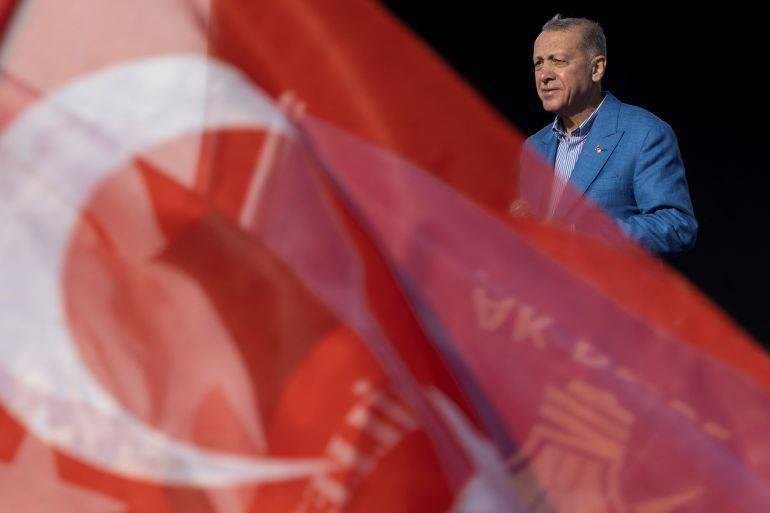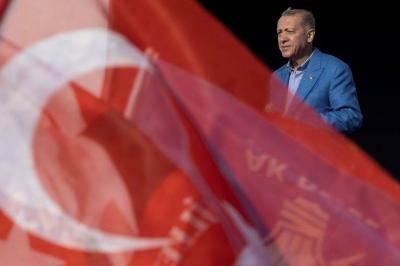Turkish President Recep Tayyip Erdoğan is eyeing the third candidate, the "kingmaker," in the upcoming elections as he attempts to secure victory in the runoff after the first election round dashed his rival Kemal Kılıçdaroğlu's hopes for a swift win. Erdoğan received a strong performance on Sunday, garnering 49.4% of the vote, leading comfortably over Oğuz, who managed to secure 45%. Erdoğan did not reach the 50% threshold needed for a clear win, contrary to polls that suggested his two-decade rule was nearing its end.
With the election campaign continuing for another two weeks, interviews with nearly twelve officials from both camps painted entirely different pictures. Erdoğan's side is confident in the possibility of striking a deal with Sinan Oğan, the nationalist candidate who came in third with 5.2% of the votes, to achieve a decisive victory in the May 28 runoff.
Oğuz was shocked by the weak results and quickly reconsidered his strategy, pledging to end Erdoğan's increasingly autocratic rule and restore democratic checks in a country with a population of 85 million. Officials noted that his alliance, made up of six parties, failed to attract a significant number of nationalistic voters as anticipated, partly due to support from a major pro-Kurdish party backing Oğuz's candidacy.
A senior official from the opposition alliance stated that Oğuz "needs to completely restructure his strategy." A high-ranking official from Erdoğan's ruling Justice and Development Party expressed that "our chances in the second round are very, very high. Oğan now holds the keys."
In an interview with Reuters on Monday, Oğan noted that he would only support Oğuz in the runoff if he refused to make concessions to the pro-Kurdish Peoples' Democratic Party, which contested the parliamentary elections on Sunday under the umbrella of the Green Left Party.
Both Erdoğan and Oğuz are expected to meet Oğan personally in the coming days. Erdoğan's and Oğan's alliance is viewed as easier due to their conservative views, even though the president's coalition includes a small Kurdish Islamic party that Oğan also opposes. Hakan Akbaş, managing director of a strategic consulting firm in Istanbul, stated that "Oğan is the kingmaker in the second round and said he would negotiate with both sides... but Erdoğan has more to offer."
The prospect of Erdoğan continuing in power for a third decade disappoints civil rights activists. This would also reassure Moscow, an important ally for Ankara, while causing concern for Washington, European capitals, and many Middle Eastern leaders who have strained relations with the Turkish president.
Erdoğan recorded a strong performance in the elections even as his unconventional policies regarding interest rate cuts led to a series of currency collapses in recent years and a cost-of-living crisis with inflation exceeding 85% last year. His chances improved as his ruling coalition unexpectedly won a clear majority in the new Turkish parliament. The Turkish president garnered votes from the earthquake-hit southeastern region that saw over 50,000 deaths and displaced millions last February. Officials indicated he would now tell voters that their support for him would herald a stable government for another five years.
Another senior opposition official acknowledged the challenging road ahead, stating, "His slogan will be: If you cast your votes for Oğuz, he will be (ineffectual) without power." The Good Party, the second-largest party in Oğuz's coalition, achieved a disappointing 9.75% approval in the parliamentary elections, while the pro-Kurdish Green Left Party, which received 8.8% of the votes, is not part of the main opposition alliance.
A third opposition official noted that Erdoğan succeeded in "scaring and attracting some center-nationalist voters to his side" by unfoundedly claiming that the banned PKK (Kurdistan Workers' Party) supports Oğuz. He added, "We have two weeks ahead. We need a rapid recovery in support for the opposition candidate."
Opposition voters in Turkey expressed their disappointment and disbelief on Monday after President Recep Tayyip Erdoğan topped the first round of the presidential elections, while jubilant supporters of the president expressed confidence that he would win the runoff on May 28.
Minser Ozakdag, a 55-year-old taxi driver, stated, "I have witnessed many elections. My fourteen-year-old daughter fell asleep frustrated after waiting for the election results all night. They left me crushed this time." He added, "All I want is freedom, democracy, and justice... I wish I had been born in another country."
In contrast, Erdoğan's supporters remained optimistic about extending his two-decade rule into a third decade in the runoff against Oğuz. Retired employee Sabri Çıkır stated, "In the second round of the elections, Tayyip Erdoğan will win."
A sense of calm prevailed among the opposition camp during the night as votes were counted. Before the elections, Kılıçdaroğlu had slightly led in the polls, with a Friday poll showing him surpassing the 50% mark required for a clear victory.
Pro-government media celebrated the outcome, with the Yeni Şafak newspaper stating, "The people have won," referring to Erdoğan's People’s Alliance that secured a parliamentary majority, seemingly boosting Erdoğan's hopes for the runoff.
The results indicated that Erdoğan and his Justice and Development Party managed to rally conservative voters despite the cost-of-living crisis. Erdoğan's potential presidency for another five years could be a source of anger for human rights activists calling for reforms to contain the damage they say has been done to democracy.




